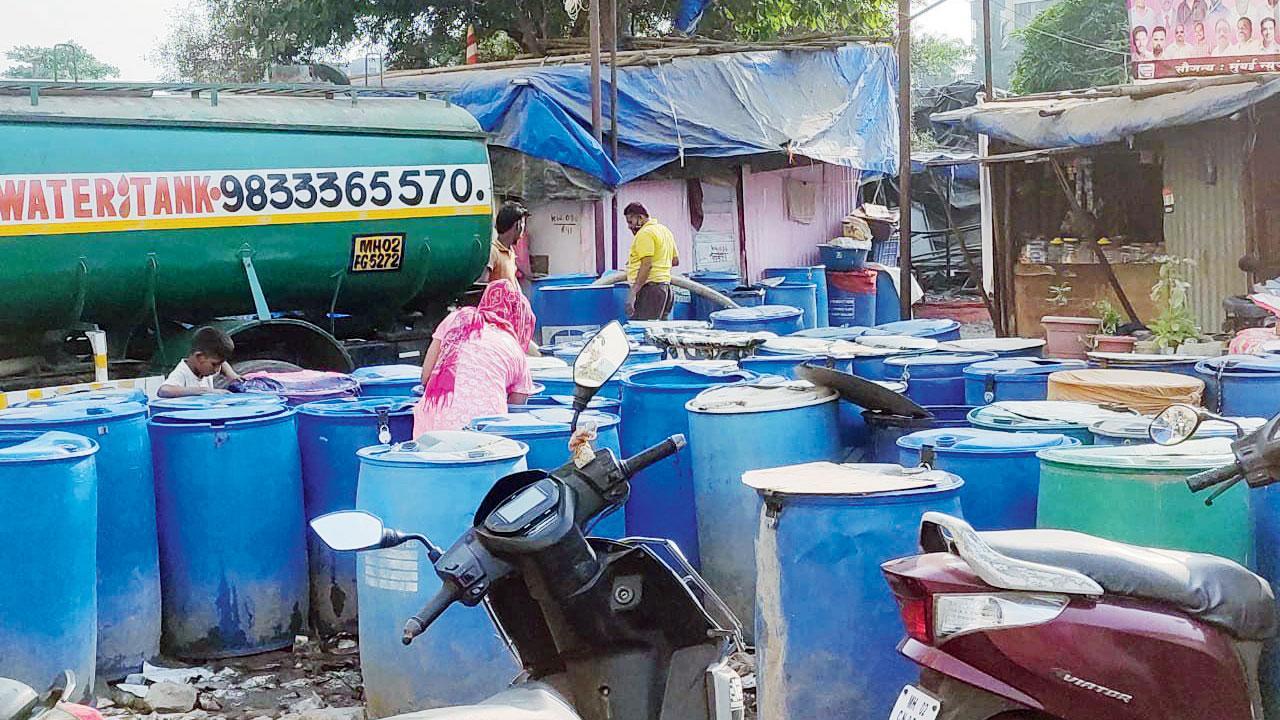Slum residents and activists say no change on the ground even after rules were eased, allege reluctance by ward officials; BMC says compiling data on sanctioned connections

People queue up with their drums to buy water from a tanker at Versova
The Water for All policy rolled out by the BMC on May 1, to ensure water connection to even illegal slums, has had little to no impact even after a month and a half. Though ward officers seemed positive in the first two weeks, the picture changed after that, claimed slum residents and activists. Even the civic body has no data on how any connections have been approved so far.
ADVERTISEMENT
The Brihanmumbai Municipal Corporation had first sanctioned the ‘Water for All’ policy in 2016 following a December 2014 order of the Bombay High Court which stated that water supply is a fundamental right irrespective of whether the house was legal or illegal. But, the BMC policy put several terms for the implementation of the policy and only a handful of slum dwellers actually received the connection. Chief Minister Uddhav Thackeray, ahead of the civic elections, announced the policy again, with much more flexibility.
Nitin Arte, chief engineer of BMC’s hydraulic engineering department, said, “We are compiling data of connections sanctioned under ‘Water for All’ policy at ward levels but it hasn’t been completed yet.”
Rules relaxed, but no connection yet
Ganpat Patil Nagar in Dahisar West is one such slum where most of the residents still pay a hefty amount to buy water. After the policy rolled out, the residents approached ward officers with applications.
“Even as all political parties are taking credit for the policy, there is no work on the ground. Earlier there were two issues due to which we could not get the connection. But now even though the rules have been relaxed, the officers ask us for random things like signatures on all papers by licensed plumbers etc,” said Sunil Yadav, resident of the slum which has over 12,000 families.
Yadav said, “The overall cost for a connection for five families is less than Rs 5,000 including all paperwork and charges of the BMC. However, the residents have to shell out another Rs 20,000 or so to lay the pipeline as the slum is around 250-300 metres away from the main line.”
The scenario is more or less the same in other wards too. In Mankhurd, the BMC abruptly put all water connection work on hold before the start of June and told residents that the work would start only after the monsoon. Bhim Nagar in Mankhurd has 850 houses, of which 100 houses received connections before the pandemic.
Abrar Salmani, activist, said, “After the new policy was announced, we approached ward officers and they were ready to start the work. Residents had paid Rs 484 as fee two years ago, and had to pay another Rs 800. However, the ward officers are now saying that the work will begin only after the monsoon.” He added of the 450 applications sent by him, only 80 were sanctioned.
Connections sanctioned, but no water yet
In Versova, too, connections were sanctioned but the work is far from completion. “After the policy rolled out, the ward sanctioned our connections within two weeks and assured us that connections will be laid before May 31. But as the deadline came closer, they started giving excuses like staff crunch, leaves etc. We helped them in every aspect such as measurement, mapping of lines, but now they seem reluctant. I have been going to the ward office and following up with them, but they haven’t given us a tentative date of completion,” said Jay Mati, a resident of Siddharth Nagar slum in Versova which has around 850 houses. The residents get water tankers once in two to three days and have to shell out Rs 40 for a bucket of water. Children even do odd jobs at neighbouring buildings to get water.
Sitaram Shelar, activist and founder of Pani Haqq Samiti, said, “There are around 150 slums with around 20 lakh residents who don’t have water connection. The BMC already had the policy on paper but due to the strict rules it was never implemented. Even now ward officials come up with different rules. There is hardly any positive response even after a month and a half.”
 Subscribe today by clicking the link and stay updated with the latest news!" Click here!
Subscribe today by clicking the link and stay updated with the latest news!" Click here!







